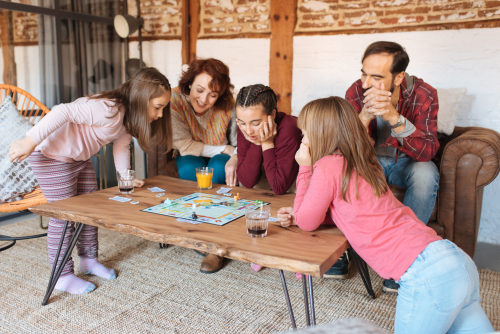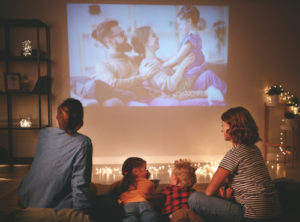Whether you’re a stay-at-home parent with one child or a working parent with six kids, it’s a sure bet that you’re busy. But no matter how rushed your routine may feel, making time for family game night- however that fits into your household- is worth it.
Field research and real-world experience reliably show that family game night benefits kids and the family as a whole. We’ve covered some of the best board games and best family board games out there- here’s why you should turn these and others into a new family game night tradition.
1. Family game night brings the family together in one place

Sounds like no big deal? When was the last time you and your family were all seated at one table? If you can’t remember, then you’re not alone- more than ever, families are busy. And while it seems like everyone’s quick to shame modern parents over their busy schedules, work commitments, and attachment to their phones, we say that families being chronically busy isn’t a bad thing.
Kids are learning more than ever through homework, parents are staying in closer contact with their friends through social media, and everyone’s more involved with hobbies and fitness than ever before. In short, today’s busy families are living their “#bestlives.”
But it is true that multiple busy schedules means that individual family members only come together as a group on special occasions. Instituting a family game night can change all that by bringing the family together around a shared activity. Gathering with intention communicates that you like spending time with one another and can enjoy being together. For this, taking a shared break from our (wonderfully) busy lives is more important than ever.
- Game night creates an intentional and purposeful gathering
- Sharing fun brings people closer
2. Family game night teaches social skills

Have you ever found yourself gloating when your spouse lost in a game of Sorry? Or watched your kids helping out by giving one another pointers while playing Jenga? Games can bring out the best- and worst- in us. And whether we’re adults or kids, game night also gives us an opportunity to build on our character strengths and work on our weaknesses. Board games give us a chance to practice better social skills like sportsmanship, cooperation, and negotiating, in a safe and low-stakes environment.
For little kids, playing any board game or card game can teach important social skills: waiting, turn-taking, and fairness. They also get to practice being a good winner and a good loser, equally important lessons that apply to sports, school, and life. Older kids can learn higher-level skills like patience and perseverance from family game night.
Alternating games can exercise different skills as well. Team games like Pictionary can help teach collaboration and cooperation, while competitive games like Clue and Candyland can teach kids to compete with fairness and kindness.
- Game night builds good sportsmanship
- Games are a safe environment for practicing pro-social skills
3. Family game night teaches academic skills

Whether your kids are reluctant learners or star pupils, they can make academic gains through family game night. Research from Carnegie Mellon University has demonstrated that young kids can gain math skills by playing board games. Older kids can pick up on more advanced skills through classic board games as well; Monopoly teaches math, Scrabble and Boggle teach spelling and vocabulary, and games like Clue teach deductive reasoning. There are also plenty of popular modern games expressly designed to teach logic, such as Quirkle.
Why should learning be a part of family game night? Any parent who has struggled through a deck of flash cards with their child knows that rote memorization and practice drills is usually dull at best, and deeply frustrating at worst. Any time kids can gain an academic skill without deliberate classroom learning, that’s a huge win.
When kids are having fun doing games with words and numbers, their interest is stimulated, and can lead them to feel more positive about vocabulary, math and other subjects in school. And when kids put their academic skills into practice to help win a round of Monopoly or Bananagrams, they get to see how applying classroom knowledge helps them in real life.
- Board games teach skills in counting, math, spelling, and logic
- Using academic skills to win can be motivating for kids
4. Family game night is screen-free

Parents catch a lot of flack for exposing kids to digital content. But screen time is a normal, and even healthy, part of modern family life. Social media keeps parents connected to other families. Skype lets kids stay in touch with far-off relatives. Educational games, TV, and apps teach our kids real skills. And there’s nothing wrong with enjoying some just-for-fun content as well- especially when it helps fill the dreaded dead time kids spend in waiting rooms and on car rides!
All that said, screen time is only healthy when it’s monitored and limited. The American Academy of Pediatrics recommends no more than 30 minutes of digital media per day for most kids. It’s important to pry kids away from their tablets, TVs, and computers regularly. But it’s even more important to show them how to have a non-digital good time. Sharing the lighthearted competition, silliness, and simple fun of board games at family fun night can help kids actually enjoy analog entertainment.
- Family game night gets kids away from screens and involved in active play
- Having fun with family game night makes kids enjoy and value non-digital activities
4. Family game night is memorable

When you think back on your family, what cherished memories come to mind? Probably holiday celebrations and special vacations- times when you all stepped away from your daily routine and enjoyed some pure fun in one another’s company.
What if you could have that kind of special shared experience over and over, without taking time off work, booking flights, or decorating the house? For around $20, the price of a quality board game, and about an hour per week or two, you can create memories that are priceless and timeless.
It’s well-established by psychology research that the strongest long-term memories are distinctive (i.e., not part of the everyday routine) and associated with strong emotions (i.e., Intense excitement or fun). Family game night fits both criteria. Switching things up regularly with new games can add some memorable novelty, and keeping some extra-silly games in rotation (think Twister and Canoodle) can up the fun factor.
Your choice of games and how you play them will wind up reflecting your family’s values and character- whether that’s competitive and ambitious or goofy and creative. Your choice of board games and how you play will naturally become a family tradition as unique as you are. And those group memories will create a solid ground of shared positivity that is the basis of strong family relationships.
- Family game night is a quick and low-cost way to make memories together
- Sharing fun builds positive memories and adds to stronger family relationships
Five Tips for The Best Family Game Night
Family game night can be as simple as a deck of cards, a bowl of popcorn, and a kitchen table. Games have rules, but there are no rules for family game night, and if you feel confident with just the basics, you may not need any tips to get you started! But if you’d like a few pointers, read on for some tried-and-true tips for starting a family game night.
1. Start simple

When you decide to start a new family tradition, it’s easy to get excited about the novelty of the whole thing. The last time you played a board game, simple games like Cooties, Hungry Hungry Hippos, and Mousetrap may have been cutting edge. Times have changed, and there are a slew of incredible new board games available today, with high-design board games like Mosaic, brain-bending games like Logic Dots, and even complex, multi-day games like Catan. If you haven’t yet explored, start with our list of the best board games of 2019.
Once you start looking at the range of incredible and innovative board games, it’s easy to go (pardon the pun) over-board. Go ahead and grab some challenging and unusual games for your family. But when you roll out your new family tradition, start with something everyone’s already family with.
This will mean that you’re not introducing a new routine and a new game at the same time, and no one will have to spend their first family game night reading the directions and learning the ropes. Dive in with something fast, fun, and simple, like Connect Four or Jenga. Build up some momentum with the basics, and your family will be playing Risk and Dungeons and Dragons before you know it.
2. Set aside a time

We know your family is busy. Really, really busy. Between work and school, homework, housework, hobbies, extracurricular, fitness, and socializing, both parents and kids are spread thinner than ever. If you’ve decided that family game night is worthwhile, you’re probably wondering how you can make it work for your family. The single most important thing you can do for your family game night is to set aside a dedicated and regular time and commit to it.
What will that look like for your family? It’s very important to be realistic. An hour per week would be wonderful (Monopoly Mondays? Trivial Pursuit Tuesdays?). But 30 minutes twice per month is also great. It’s tempting to start off with the idea of doing more, and more frequently, but you’ll risk being unable to keep up with your big plans when (inevitably) life gets in the way.
Instead, it’s better to start off small and see if you can stick with it. Maybe after a few months, you’ll want to step up the length or frequency of your family game nights. Whatever you decide to do, program it into your phone or mark it on your desktop calendar, and take it as seriously as a work meeting or doctor’s appointment. With all the demands on the modern family, making time for fun is serious business- but more than worthwhile!
3. Create a ritual

When you get up in the morning, you probably run through a series of steps that help you get ready with minimal brain-power and help you get mentally ready for your day. At night, you probably have a bedtime routine that you go through on auto-pilot that helps you mentally power down and relax. If you want family game night to become a natural part of your household’s life, and one that occupies a special emotional space, you’ll need to create a family game night ritual. This can be something you have fun planning or can simply evolve organically out of what’s most convenient for you.
There’s really no need to go crazy replicating 1950’s housekeeping magazine spreads or modern Pinterest boards when you set out to create your family game night space, snacks, and routine. Have a quiet place in your house where everyone can comfortably gather around a table. Grab a crowd-pleasing and non-messy snack like a bowl of tangerines or popcorn (healthy!) or a box of donuts or pizza (fun!).
Decide how you want to play- does the person who won last time get to pick this week’s game? Are kids playing against parents? Are you playing to win a special prize, like control of the remote? Make family game night your own and it will become a naturally ingrained and totally personal part of your family’s life.
4. Involve everyone.

Guess what big kids hate? Being bored with baby stuff. Guess what little kids hate? Being left out of big kid stuff. If you have multiple children, you’re no stranger to the gap in interests and abilities that exist between kids. This is especially true if you have several kids of different ages, or if your kids have a large age difference.
Whether you’re choosing a movie or a restaurant, or a board game for family game night, it can seem impossible to find one choice that will keep everyone happy and engaged. The last thing you’ll want is for family game night to become an unhappy chore that frustrates your youngest or goes your oldest. Fortunately, there are a few things you can do that will help involve everyone, from little kids to teens, and even grandparents.
Like most shared family choices, the best options are usually narrowing down choices, looking for consensus, and alternating turns. First, narrow down your choices by stocking your family game cabinet with board games that are more or less age-appropriate for everyone. This may mean that Candyland stays in your toddler’s room, and Magic The Gathering stays in your tween’s room, while you offer choices that are playable for everyone when family game night rolls around.
Next, you may want to look for consensus by putting it to a vote, and choosing the night’s board game democratically. Another option is to give family members take turns choosing the night’s game. Once you’re playing, you can keep everyone on the same page by giving the youngest family member some extra help (like hints, first turn, or some bonus cards) or teaming them up with an older family member. Keep older kids engaged by giving them a special role like dealer for poker or banker for Monopoly.
5. Keep it fun

Surprisingly, parents are the number one spoilers of family game night. Kids may bicker about fairness or wail about not winning, but kids consistently report that their parents poop the party by letting their competitive sides take over. It’s funny to think about grown adults getting overheated and shouting over a game of Farkle, but it happens more often than you’d think.
Some people don’t know they have such a competitive streak until they start up a family game night practice, or don’t realize it’s taking over until their kids start to complain. However, it sneaks up, aggression and competitiveness can suck the fun out of family game night faster than a missing game piece, and defeat the purpose of this meaningful family tradition.
Parents can ensure that family game night stays fun and lighthearted simply by monitoring their own behavior and intentionally checking their egos at the door. Parents should make a point of shrugging it off when they lose, congratulating others when they win, and laughing throughout the game.
This kind of healthy modeling teaches kids in a natural way how they should deal with competition, which is an important part of being a successful and well-adjusted person in sports, school, and work. Show kids that they can have a blast whether they win, lose, or draw, and family game night will always be memorable, enriching, and fun.








